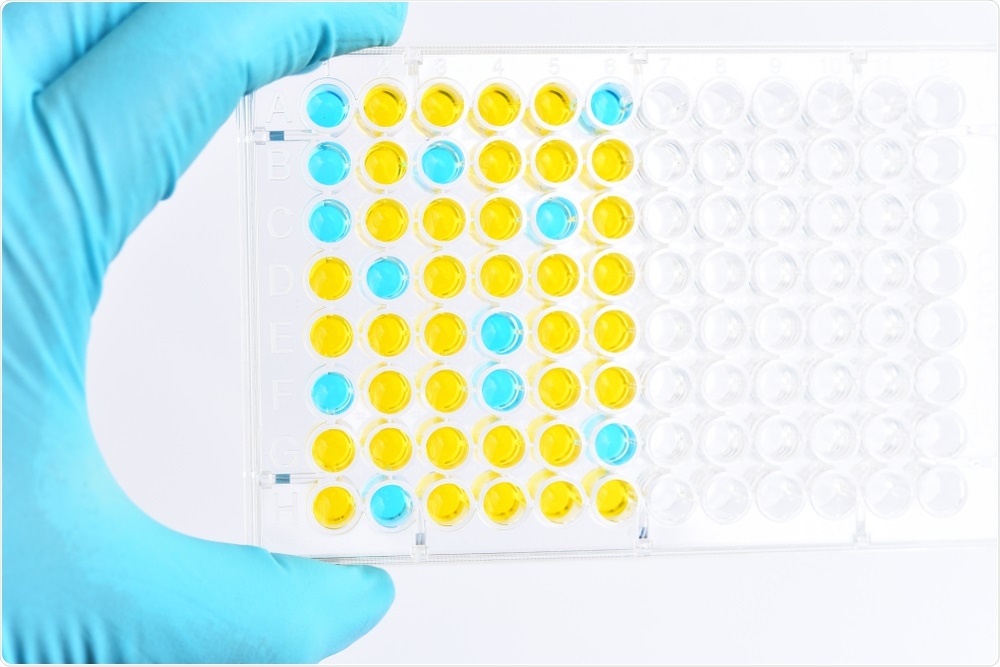Coronavirus disease 2019 (COVID-19) pandemic, caused by SARS-CoV-2, has resulted in millions of cases and over 466 thousand deaths worldwide. Although active infection is routinely detected by testing for viral genetic material, this approach cannot be used once the symptoms have resolved.
This is why antibody testing comes into play as a convenient method to determine historic exposure to the virus, obtain important insights into the immunological status of the individual, as well as to measure correlates of protection against potential re-infection.
But albeit the antibody detection in hospitalized patients with the severe disease has proven to be a rather straightforward task, detecting responses in individuals with asymptomatic infections and mild forms of the disease has proven less reliable – possibly due to suboptimal sensitivity and the compartmentalization of the antibody response.
Hence, more sensitive, scalable, and specific serological assays are essential to tackle this pandemic and to diagnose SARS-CoV-2 associated complications even after the active phase of the disease.
This study by researchers from the University of Birmingham, University of Southampton, Oxford University, University Hospitals Birmingham NHS Foundation Trust, Binding Site Group Ltd, and Immunodeficiency Centre for Wales, reports on the utilization of an antibody assay to detect antibodies in individuals with lower levels of SARS-CoV-2 specific-antibody response.
How to detect lower levels of antibodies?
This research group systemically developed an enzyme-linked immunosorbent assay (ELISA) assay by optimizing different antigens and amplification steps. The use of this assay was amenable for serum and saliva samples derived from symptomatic and asymptomatic SARS-CoV-2-infected individuals.
All the samples for this study were collected from health care workers at University Hospitals Birmingham NHS Foundation Trust as part of the CoCo study, which is an ambitious research endeavor aiming to study the immunology of COVID-19 in detail.
In order to detect lower levels of antibodies, the researchers examined responses to two well-characterized viral proteins: the surface-exposed spike protein (S-protein), which is targeted by neutralizing antibodies, and the nucleocapsid protein (N-protein) as the most abundant viral protein.
Their method focused on applying different approaches to discern the best' signal: noise' ratio, and upon identifying the optimal approach, the plan was to determine the relationship between antibodies in serum and saliva.
SARS-CoV-2 trimeric S-protein as an ideal target
In this modified ELISA method, a total trimeric S-protein in direct comparison to N-protein provided improved discrimination between SARS-CoV-2 positive and negative samples, i.e., it can be used as a better way to separate between infected and non-infected individuals.

Enzyme-linked immunosorbent assay or ELISA plate, Immunology testing method in laboratory. Image Credit: Jarun Ontakrai / Shutterstock
Furthermore, the researchers found that samples from hospitalized individuals had stronger Immunoglobulin G (IgG), Immunoglobulin A (IgA), and Immunoglobulin M (IgM) antibody responses against all relevant antigens, which reinforced the available data from the medical literature.
However, the main novelty was the notion that antibody subclass distribution does not differ depending upon disease severity; therefore, combined detection of IgG, IgA, and IgM can enhance the detection of antibody responses in the entire spectrum of disease presentations.
Additionally, only IgG, IgA, and IgM antibodies against S-protein are detectable in saliva from self-reported symptomatic individuals, but not those against N-protein. Also, antibodies to S-protein in saliva can be identified independently of serum responses.
Towards the more sensitive ELISA method
This work will undoubtedly aid in accelerating the development of sensitive ELISA techniques for our diagnostic armamentarium; more specifically, standard ELISA methods that are based on high-quality S-protein can be readily modified to detect serum and saliva antibody responses in severe, mild and asymptomatic COVID-19.
"Understanding the relationship between the varied clinical presentations of COVID-19 and the serological response that arises during and following infection will be of major significance in understanding the immunopathogenesis of disease and selecting appropriate treatments", reinforce study authors in their medRxiv paper.
Likewise, this can serve as an additional tool for appraising short and long-term humoral SARS-CoV-2 immunity (especially for community-acquired COVID-19) and understanding the nature of natural and future vaccine-induced protective responses.

 This news article was a review of a preliminary scientific report that had not undergone peer-review at the time of publication. Since its initial publication, the scientific report has now been peer reviewed and accepted for publication in a Scientific Journal. Links to the preliminary and peer-reviewed reports are available in the Sources section at the bottom of this article. View Sources
This news article was a review of a preliminary scientific report that had not undergone peer-review at the time of publication. Since its initial publication, the scientific report has now been peer reviewed and accepted for publication in a Scientific Journal. Links to the preliminary and peer-reviewed reports are available in the Sources section at the bottom of this article. View Sources
Journal references:
- Preliminary scientific report.
Faustini, S.E. et al. (2020). Detection of antibodies to the SARS-CoV-2 spike glycoprotein in both serum and saliva enhances detection of infection. medRxiv. https://doi.org/10.1101/2020.06.16.20133025.
- Peer reviewed and published scientific report.
Faustini, Sian E., Sian E. Jossi, Marisol Perez‐Toledo, Adrian M. Shields, Joel D. Allen, Yasunori Watanabe, Maddy L. Newby, et al. 2021. “Development of a High‐Sensitivity ELISA Detecting IgG, IgA and IgM Antibodies to the SARS‐CoV‐2 Spike Glycoprotein in Serum and Saliva.” Immunology 164 (1): 135–47. https://doi.org/10.1111/imm.13349. https://onlinelibrary.wiley.com/doi/10.1111/imm.13349